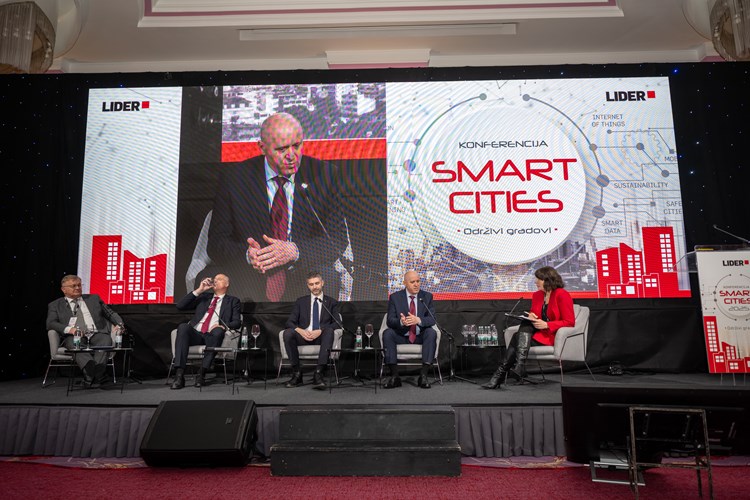- Published: 18.03.2025.
Bačić: We launched National Housing Policy Plan before EU
Hina - Minister of Physical Planning, Construction and State Assets Branko Bačić said on Tuesday at a panel on urbanism and affordable housing at the international conference "Smart Cities" that the government launched the National Housing Policy Plan before the EU, and that cities are the most important partners.
Bačić said that the National Housing Policy Plan will probably be presented at the government session next week, together with one of the most important laws that represents the implementing act of the National Plan, and that is an urgent amendment to the Socially Stimulated Housing Construction Act, which will develop into a completely new Social Housing Act by the end of the year as one of the basic laws for the implementation of the National Housing Policy Plan.He announced that by the end of this year, there will be 13 more legal acts in Parliament, including new laws on construction, physical planning and energy efficiency in the building sector.
Due to the increasing need for affordable housing, which is becoming less and less available due to the marked increases in real estate prices and rents, the government decided to create the first umbrella strategic document for the medium term to provide affordable housing for young people and young families.
They determined, the minister pointed out, that there are almost 600,000 empty housing units in Croatia, while at the same time the demand for apartments is at the level of over 235,000 flats.
Therefore, he said, they have devised several measures, one of which is to start activating these empty flats, but without giving up on the construction of entire new neighbourhoods that the state will plan with the cities.
They have devised an affordable housing programme that implies that the state as the owner, which also has 1,500 empty flats, offers them on the market and at an affordable rent for use by citizens in need.
Also, empty flats in private ownership will be activated, and the owner of the flat would receive full rent from the state, while the tenant renting that flat would pay an affordable rent.
Zaprešić Mayor and the president of the Association of Cities Željko Turk said that Zaprešić's advantage is that it is near Zagreb, and has lower flat prices, quality transportation, a place for every child in kindergarten, and good education. Through spatial plans they stopped too rapid urbanisation, reduced the number of buildings and increased green areas.
Slavonski Brod Mayor Mirko Duspara said that in 2016/2017 they started building flats for rental, with the option to buy them after 10 years, which attracted young people, because after being tenants for 10 years, if they decide to buy the flat, the city deducts the entire amount of rent they paid from the price. So far, they have built 44 such flats, and they have also launched a measure for the construction of family houses, where Slavonski Brod has leased out its plots for 99 years, with an option for young people who build a house to buy the plot after ten years and repay it within 99 years. So far, they have built 65 family houses, and about 30 are under construction. Last year, they also launched an affordable housing measure, they are constructing two buildings, and young people will pay 50% of the rent for the flat.
Franković: First affordable housing model was introduced by Dubrovnik
Dubrovnik Mayor Mato Franković pointed out that the first affordable housing model in Croatia was introduced by the City of Dubrovnik, and their model was taken as the model for the national housing policy plan for youth. He pointed out that they started this model in 2017 and so far have kept 90 young families in Dubrovnik and provided them with affordable housing, and affordable rent for 10 years. Also, in 2018, they purchased 70,000 square metres of agricultural land that they will convert into construction land for affordable housing, while 50 flats in the heart of the city are ready, which they intend to realise with the government. He pointed out that the biggest problem in cities is short-term rental, which is a "killer of affordable housing".
Split Mayor Ivica Puljak said that they have established an initiative with Osijek, Zagreb, Rijeka and Varaždin and had a meeting with the European Investment Bank through which they will develop a sustainable model to create at least 2,000 flats for rental in Split in the next few years.
Deputy Mayor of Zagreb Luka Korlaet pointed out that they made a decision to ban the sale of city flats, increased the "tourist flat-rate" per bed per year to a maximum of 200 euros, and made a decision regulating social and affordable rent. In a few days, the construction of a building with 300 flats will begin in the Podbrežje neighbourhood, and construction will also take place in Borovje and Sveta Klara.
At the 11th Lider's Conference "Smart cities", mayors spoke about plans, experiences and examples of good practice in digital and green transition, urbanism, affordable housing, modernisation of infrastructure and digitisation of public services.




